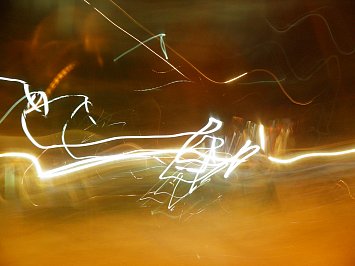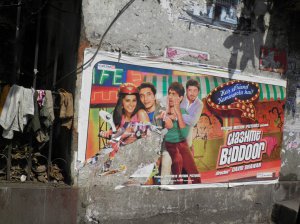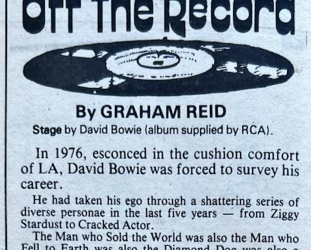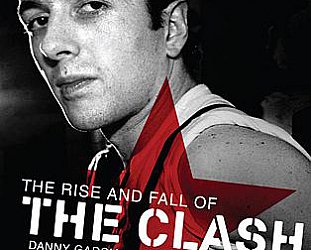Graham Reid | | 2 min read

In the blackness through rural roads, candle-lit villages and weakly illuminated towns here in western India, our bus driver passed perilously close to a man on a motorcycle – who just briefly I saw beneath me out the window – and clipped him.
There was a heart-thumping thud and the scour of metal on asphalt.
People felt it, our bus stopped, within minutes outside the windows there was the customary crowd-from-nowhere which India can provide and then – surprisingly – our driver got back on.
The motorcyclist was fine apparently, just shaken.
There was a sombre mood on the journey back.
 Suddenly from out of the night with relentless persistence, our bus was surrounded by angry men and boys on motorbikes, scooters and bicycles. With fists shaking and voices raised they slowed the bus and forced it to a halt.
Suddenly from out of the night with relentless persistence, our bus was surrounded by angry men and boys on motorbikes, scooters and bicycles. With fists shaking and voices raised they slowed the bus and forced it to a halt.
They banged on the window and increasingly angry voices from the darkness demanded the driver get off. The mob thumped the sides of the bus, flaming torches punctuated the night. A stone cracked against the glass.
“Tell him to get off, they'll kill us,” shrieked an English woman beside me.
“Someone call the police,” she screamed. “They'll get on and kill us all!”
In the half-light I saw – just for a moment – the wild eyes of a young boy with a rake raised in inchoate fury. He looked like he'd murder me without a second thought.
A British video-blogger ran to the front with his camera, filming everything, just in case . . .
Some Indians from Europe shouted something out the window at the mob . . .
The police were coming, the Indian man told us, we just had to wait . . .
Just below me was the bus' petrol tank and standing beside it a man with a flaming torch.
A European woman somewhere behind me started screaming, outside a rage of villagers gathered like a storm. There was fire in the night.
In the centre of fury, we waited.
And we waited.
Over time -- maybe 10 minutes, it seemed longer -- the howl of the mob abated as they wearied and realized we wouldn't let the driver off and be abandoned to his fate. When the police arrived the crowd dissipated into the darkness and our driver took us back the train.
A few of us went to the bar and drank silently for a while, then the Honeybee brandy took hold and we found humour in the day: the fly-filled fish market, the lost taxi driver, the haughty desk clerks. And the pay-off to the local villagers by the bus driver and his company.
The fearful English woman scuttled past, embarrassed by her outbursts.
Soon enough we all went back to our cabins where an underpaid man in an over-dressed Raj-uniform waiting patiently, just to open the door for us.
The following morning the train pulled out.

And away we went.
And went even more into that astonishing, beautiful, bizarre, bewildering, rewarding and always surprising country.
A place where ancient spirituality and modern society fight for space in the 21st century, and where an ease of meditative moments can be counteracted by excessive emotion.
Along the way the Dutch guy and I discussed the previous day, I said it had been like a raga, the classical Indian musical form: It started slow, we improvised a bit and then it ended in a fiery and fast coda.
He looked at me blankly so -- with as much irony as cheap wit – I quoted the country's tourism slogan.
“Incredible India.”
We didn't laugh.
.
.
These entries are of little consequence to anyone other than me Graham Reid, the author of this site, and maybe my family, researchers and those with too much time on their hands.
Enjoy these random oddities at Personal Elsewhere.





Aroha Mahoney - Sep 9, 2024
This reminds me of a trip we did through the back roads of Rajasthan some years ago. We had a car and driver and had several moments such as you describe, with an angry? curious? crowd surrounding the car. The worst moment was in the back of beyond when my husband and our driver went off to get some black market petrol, leaving me cowering in the back seat for what seemed like ages, faces outside pressed up to the glass and a fearful cacophony. You summed it up very well in your last two descriptive paras.
Savepost a comment